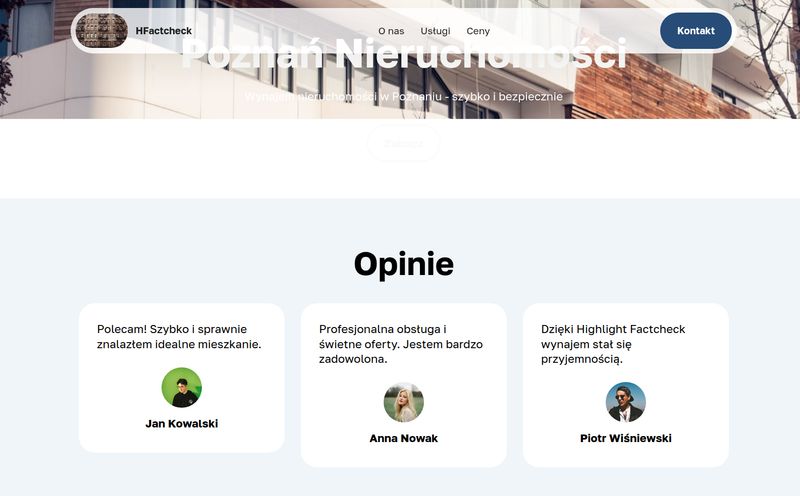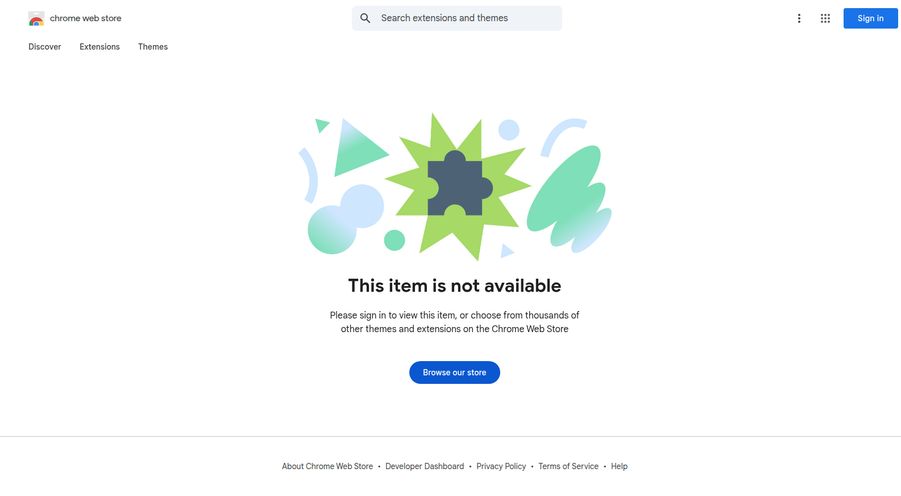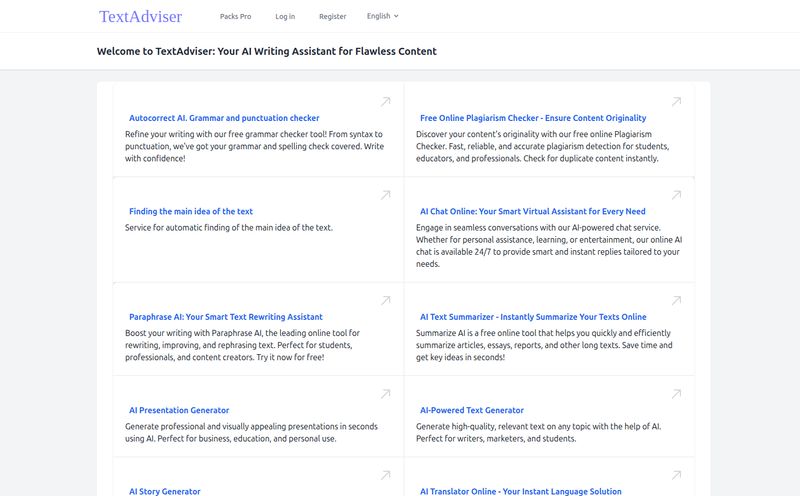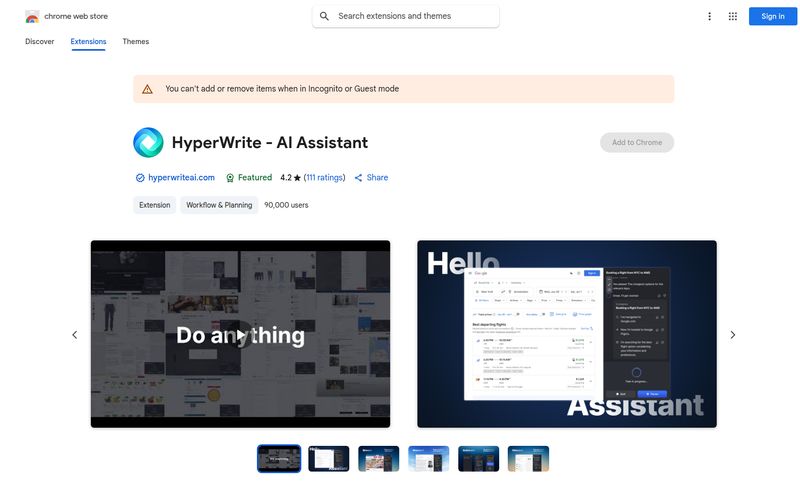We've all been there. You've used an AI assistant to help knock out a first draft—maybe for a blog post, a school paper, or some marketing copy. You read it over, and it sounds... well, it sounds like a robot wrote it. Then comes the cold sweat. The fear of the dreaded AI detector. That little progress bar that decides if your work gets flagged as 100% AI-generated. It’s a modern-day content creator's nightmare.
The whole space is a frantic cat-and-mouse game. AI writers get better, and AI detectors get smarter. Tools like Turnitin and ZeroGPT have become the gatekeepers, and for many, the anxiety is real. I’ve been in the SEO and content game for years, and I've watched this arms race with a mix of fascination and mild panic. So when a tool like Undetectable.wtf pops up on my radar, claiming to “humanize” AI text and slip past these digital watchdogs, my curiosity gets the best of me. Is it just another content spinner in a fancy new outfit, or is there something more to it?
So, What Exactly is Undetectable.wtf?
At its core, Undetectable.wtf is an AI detection bypass tool. But that description feels a little flat. It’s not just scrambling words around like some of those old-school article spinners that would produce unreadable garbage. The goal here is to take text that was generated by an AI and rework it so that it reads like a human wrote it. It aims to smooth out the robotic phrasing, weird sentence structures, and predictable patterns that AI detectors are trained to spot.
The process they advertise is laughably simple, which is a huge plus in my book. You don't need a degree in computer science to figure it out. It's a three-step dance:
- Paste Your Text: You just copy your AI-generated draft and drop it into their input box.
- Process It: You hit a button and let the tool do its thing.
- Copy the Result: It spits out a new, “humanized” version of your text that you can use.
It’s clearly built for people who just want a solution without a steep learning curve. Students staring down a Turnitin submission deadline are a huge audience here, and you can tell from the testimonials on their site.
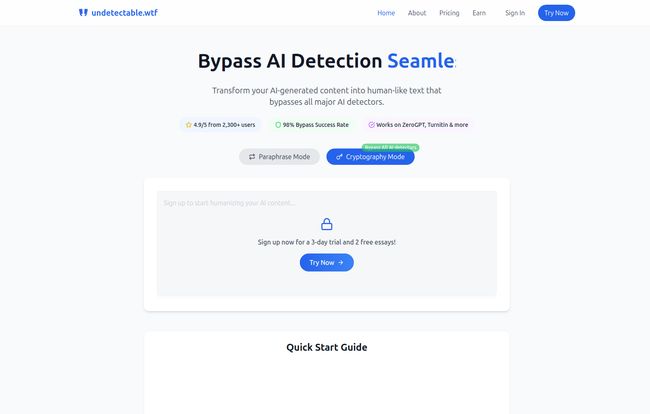
Visit Undetectable.wtf
The Standout Features
Okay, so it's simple. But what’s actually happening under the hood? The tool operates using a couple of different methods to get the job done.
The Two Flavors of Humanization: Paraphrase vs. Cryptography
This is where things get interesting. Undetectable.wtf gives you two modes to choose from. Paraphrase Mode is likely what you’d expect. It intelligently rephrases sentences, swaps out common AI vocabulary for more natural alternatives, and varies the sentence structure. It’s about changing the linguistic style.
Then there's Cryptography Mode. This one sounds like something out of a spy movie. While I haven't seen their source code, this mode probably goes beyond simple rewording. It might be embedding subtle, invisible characters or using clever text encoding tricks to disrupt the patterns that AI detectors rely on. Think of it like a digital invisibility cloak for your words. It’s a more aggressive approach for tackling the most stubborn detectors.
Broad Detector Compatibility
A tool like this is only as good as the detectors it can beat. The team at Undetectable.wtf claims a 98% success rate and explicitly mentions that their tool works on major platforms like ZeroGPT, Turnitin, and others. For any student or academic writer, seeing “Turnitin” on that list is the main event. That’s the big boss, and claiming you can beat it is a bold statement.
The Million-Dollar Question: Does It Actually Work?
I’ve seen dozens of tools make big promises. The proof, as they say, is in the pudding. The user reviews on their site (from a claimed 2,300+ users) are glowing, with students saying their essays passed with no issues. Of course, you have to take on-site testimonials with a grain of salt.
The most honest way to find out is to try it yourself. And this brings me to one of the best things about their model: the free trial. You can process two essays for free within a 3-day window. This is more than enough to run your own tests. Generate some text with ChatGPT, run it through a detector to get a baseline score, then run it through Undetectable.wtf and check it again. It’s a no-risk way to see if it lives up to the hype for your specific needs.
Breaking Down the Pricing Tiers
So, you tried the free trial and you’re impressed. What’s it going to cost you? The pricing structure is pretty straightforward and tiered based on usage. I've always appreciated transparency here; nothing's worse than having to hunt for a price tag.
| Plan | Monthly Price | Key Features |
|---|---|---|
| Free Trial | $0 | 2 Free Essays, 3 Days Access |
| Standard | $12.99 /month | 6 Essays per Month, Priority Support |
| Pro | $24.99 /month | 15 Essays per Month, Faster Humanization, Beta Features |
They also offer a 17% discount if you pay yearly, which is a nice little incentive for long-term users.
The Standard plan seems perfect for a typical student or a blogger who needs to polish a few articles a month. The Pro plan is clearly aimed at power users—freelance writers, marketing agencies, or students with a beast of a courseload who are churning out papers constantly.
The Other Side of the Coin: The Drawbacks
No tool is perfect, and a fair review means looking at the downsides. I have a few hesitations.
First, the essay limits on paid plans could be a sticking point for some. 6 or 15 essays might sound like a lot, but if you're using it to redraft sections or experiment, you could burn through them quicker than you think. An unlimited plan would be a welcome addition.
Second, this is an ongoing battle. While it might have a 98% success rate today, AI detectors are constantly being updated. There's no permanent guarantee of success. Users need to understand that this isn’t a one-and-done solution but a tool in an ever-changing technological landscape.
Finally, there's the ethical discussion. Does relying on a tool like this weaken your own writing skills? It’s a valid concern. My take? It depends on how you use it. If you're using it to mindlessly produce content you dont even read, then yes, that's a problem. But if you're using it as a sophisticated editing partner—to polish a clunky AI-generated first draft into something more fluid and natural—then it's just another tool in your writer's toolkit, not much different from a grammar checker or a thesaurus.
Final Thoughts: Is Undetectable.wtf a Keeper?
After looking at everything, I'm genuinely intrigued by Undetectable.wtf. It’s not pretending to be something it isn't. It’s a purpose-built tool designed to solve a very specific, very modern problem. Its simple interface, specialized modes, and transparent pricing are all strong points.
Is it a magic wand that will solve all your writing woes? No. But is it a potent tool for anyone generating content with AI and feeling the heat from detectors? Absolutely. The fact that you can test it out with a couple of free essays makes it a no-brainer to at least try. In the endless race between creation and detection, Undetectable.wtf is a surprisingly strong contender.
Frequently Asked Questions (FAQ)
- Does Undetectable.wtf really work with Turnitin?
- According to their website and user testimonials, yes. They specifically list Turnitin as one of the major detectors their tool is designed to bypass. The free trial is a great way to verify this for yourself before committing.
- Is Undetectable.wtf a free tool?
- It offers a free trial that includes 2 free essays and 3 days of access. For continued use beyond that, you'll need to subscribe to one of their paid monthly or yearly plans.
- What is the difference between Paraphrase and Cryptography mode?
- Paraphrase mode focuses on rewriting the text to make it sound more natural and human. Cryptography mode is a more technical approach, likely using hidden methods to disrupt the patterns that AI detection algorithms look for, making it a stronger option for tough detectors.
- Is it wrong or unethical to use a tool like this?
- This is a gray area and depends on your intent. If used to pass off 100% AI-generated work as your own without any effort, many would consider that unethical. However, if used as an advanced editing tool to refine and improve an AI-assisted first draft, it can be a legitimate part of the writing process.
- Are the paid plans unlimited?
- No, the paid plans come with monthly limits. The Standard plan allows for 6 essays per month, and the Pro plan allows for 15 essays per month. Make sure you choose the plan that best fits your expected usage.
